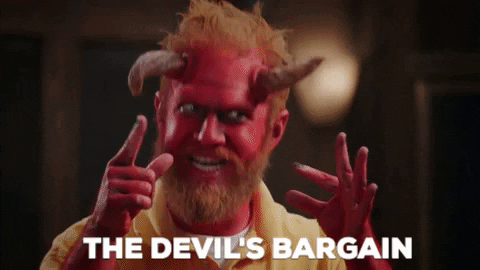Andy DeFrancesco is the devil. Just ask anyone. The worst guy in the weed business, the archangel of bad asset deals, the shell master of Florida. He’s got investigative journalists who write about nothing other than him, he’s got shareholders at various companies that have bought things from him screaming at him for taking their treasure, he’s got trolls all day long and seems almost to revel in the abuse.
When I talked to him a while back, however, I was struck by something else entirely.
“You want me on your side,” he said.
He said this not as a threat, mind you, but as a boast.
“If you had a $5 million cannabis asset and you wanted to turn it into a $25 million deal with a big player, I’m your guy. I make it happen. I get your deal ready, I deal with government, I get your permits, I get your business plan, I get your shit together, and I find someone to take it from us who doesn’t want to do all that setting up stuff but still wants what you’ve got in a format they can make use of,” he says.
You can put all the abuse on Andy DeFrancesco you want, but that part is true. Hate him, despise him, tell him not to come over on Sunday, mock him on Twitter, build a journalism website dedicated to riling him up – it’s fine. He’ll probably even bite back publicly because he likes the sport of it all. And people will gather to watch.
But his deals happen. And his people make money on those deals.
And that’s the whole object of the exercise.
[contextly_sidebar id=”wJqwS0XsM5Dh8CQL5B0Xwk9kLc4RFAkP”]”You get it,” he says, in that way I’ve been warned of, that tells you what you want to hear so you don’t get too prickly with him. He’ll tell you about his motor sports hobby, which actually does sound cool (damn it) and his kids, and his world travels, and he won’t put the phone down. You’re new best friends. Your Whatsapp account will fill your phone over the coming days with images and videos and documents and opinions he might get in trouble for, but those items will paint a picture that, when you get right down to it, is of a guy who wheels and deals, who doesn’t take a whole lot of time off, who looks after those closest to him – absolutely – but also likes to expand that circle and realizes investors need to be closer to it.
“You get it, in that you see who I am,” he says. “I buy things cheap. I fix them up. I add other things to them. Then I find a buyer, and because I know everyone and I’m getting my piece, that buyer will pay a premium” he continues.
“You can blame me that Aphria (APHA.T) bought early stage assets from me for late stage prices, and that they changed strategy with some of those pieces and didn’t deliver on their potential early on. I’ll take that. Guilty,” he says.
“But that’s the point!” he adds. “I’m SUPPOSED to buy cheap and sell high. If I’m not doing that, what the fuck are we doing here?”
He’s right. You may not like that if you’re on the other side of the deal, or if you’re at the top of the food chain and don’t like buying unfinished business. DeFrancesco is definitely not for everyone. He’s not even an acquired taste. He’s the devil in the details.
From an earlier story we wrote about the mess that is Wayland Group (WAYL.C), who bought a lot of DeFrancesco assets:
I asked Supreme Cannabis (FIRE.T) president John Fowler if there would ever be a point where his company would buy another company that was just a few months old and had no license.
“No,” was his curt reply. “We’d need to have seen them in action for some time and know they were a true team of professionals, that there were assets and advantages to doing business with them.”
I asked Cam Battley of Aurora the same question.
“One guy with a license application? No. We can do that ourselves,” he replied.
Danny Brody of Green Organic Dutchman (TGOD.T): “We’re not averse to doing a joint venture with a small operator, but we’d want to know how much money they’re putting in alongside us. JV is the keyword. We’re not going to buy someone else’s business plan.”
But other players a little further down the ladder aren’t concerned about buying an old car frame that’s been in a field for a few years, and may revel in the opportunity to customize it to their needs.
ICC International (WRLD.U) has collected so many junkers they should have their own edition of Storage Wars. Aphria went on a run on the back of a lot of DeFrancesco deals that, it turned out, the Aphria CEO at the time was a little too close to, and a bit too eager to push as more advanced than they were.
That overhyping of a deal is something the Wayland Group was infamous for. Fast running out of cash and using its own stock like Monopoly money, Wayland used that stock to buy a fast list of DeFrancesco assets that were more than early – some of them were barley conceived, many of which they ended up flipping to ICC cheaply as Wayland shriveled into obscurity.
I ask DeFrancesco about one of those, a company in the UK called Theros Pharma.
At least.. that’s what it’s called now. A few days before Wayland bought it, it was called Professor Mike Barnes Ltd.
Suddenly it was an “early stage company that has successfully imported cannabis to the UK for patients with a prescription for medical cannabis.”
“We’re proud to join with Theros on the journey to enhance lives through cannabis, now in the UK Theros’ dedicated team of professionals and advocates, who were instrumental in achieving cannabis legalization in the U.K., will work with Wayland to create access to cannabis for patients and further advocate for personalized medicine,” declared Wayland chief executive officer Ben Ward.
This was all untrue. Professor Mike Barnes was a Marc Emery-type who was generally on the call list for any news story about legalizing weed (something he only supports for medical purposes) but he hadn’t legalized it, and had no team to speak of. He’d imported a package of weed for a kid who was having seizures, that the government said ‘okay, just this once’ for. and he’d got in some trouble for being paid a stipend by DeFrancesco as a consultant while he was supposed to be advising the government.
But he was, at least, a UK citizen in the cannabis legalization scene. To Wayland, looking for a stock multiple, that wasn’t enough.
When the deal was announced, Wayland agreed to pay Theros €3.8 million in WAYL stock at $1.65 p/share (it’s worth around half that today) [that was a few months back – it’s actually worth around 10% of that today], with a promise for €24 million in stock more if/when the company gets a UK cannabis license.
We figured that was a little pricey, considering the company [..] has no facilities, no license to speak of, and may never actually get a license at all.
“I’ll tell you exactly what happened there,” says DeFrancesco. “Mike Barnes is the guy who is connected as much as anyone to the process of making cannabis legal. He doesn’t have a license, but he’s made moves before, he’s helped with some regulation discussions, and I connected with him because I needed someone local who understood the challenges and the process we’d need to go through. So we agreed to work together.”
Fair enough.
“Wayland wanted to be in the UK, I told them what we had, which was admittedly early, and they made an offer that was a good deal for all of us,” he said. “The name change, how they framed it, that wasn’t down to me. I had talked to a lot of people and believed I had the beginnings of something good and if it got to a license, everyone does well out of it, Wayland included.”
All of this is true, as far as I can see.
Company filings show DeFrancesco got into the company shortly before it was flipped, added a lot of his crew, and Barnes would be brought in on other deals subsequently as a thank you for being part of the family.
“That’s how I like to do it,” says DeFrancesco. “All these deals, I want everyone to win. But I want to be sure my company wins most, obviously,” he laughs.
“That’s why people invest in my company, in my network, and in my ability to penetrate what can be really intense processes that can involve not just government negotiations but, you know, sometimes there’s a tribe and a chief and an ambassador, and sometimes guys just come right out and say, ‘we expect you to pay us this much for our approval’, and I’m the one that navigates all that and puts together a framework a buyer can come in and take over. You want a bribe? Okay, that’s not going to happen, but now I’m going to find your boss and deal with him, and his boss and deal with him, until I get someone in a big chair saying, ‘You’re our guy.'”
“Wayland doesn’t want to go to Italy and have dinner with the ambassador a year before licenses are even available,” says DeFrancesco,” but companies like them will pay a decent amount to not have to do that, to have a guy like me do that, and to be able to cut the ribbon on it.”
In that infamous Wayland piece that we’ve quoted extensively from here, I noted that there’s nothing wrong with making a profit on a deal, that every baseball trade involves both teams thinking they outwitted the other, and it’s only when the dust has settled and the numbers are in for a season that we know who truly won.
DeFrancesco, it must be said, won on every single deal he proposed and closed.
“The Aphria assets, they’re doing well,” he says. “I got in a lot of shit on social media for taking my picture in a pharmacy in Mexico that I’d bought and sold to them – people thought it was worthless but, the thing was, that pharmacy had an actual pharma import/export license that I needed to properly develop a deal in another country, because that pharma license applied anywhere in South America, and another country wouldn’t give a cultivation permit without that license. There’s a reason for these moves, and sometimes it’s not obvious what it is, but I feel like it has shaken out okay for them.”
That’s why he’s moved on from flipping foreign assets to LPs and started flipping them to his own company, Sol Global (SOL.C).
“The market has changed,” he says. “Risk tolerance has lowered, the purse strings are tighter, and the upside on a real deal is significantly larger now, so I’m not interested in flipping for a quick $20 million. Now I want to build these deals for my company to own.”
That’s what DeFrancesco told me two months ago. And this video is what happened on July 30.
Trust me, watch the video, even if just the first 30 seconds. It’ll blow your mind, son.
Are you kidding me?
Net income was $2.30 per share, fully diluted.
A single share of Sol Global on July 30 cost $2, but earned $2.30 over the course of the year.
Part of that was a whopping $204.8 million gain on the sale of Latin american assets to Aphria and others.
Cash and short term plays come to another $182 million, on a market cap of just $110 million.
Net income was ALMOST THE MARKET CAP.
But nobody talks about Sol Global because things like this keep happening:
Television personality and legal expert Judge Jeanine Pirro has been appointed to the board of directors of SOL Global Investments Corp.’s portfolio company, Heavenly Rx Ltd., a global hemp and cannabidiol company, effective immediately.
Judge Pirro is the host of Fox News Channel’s top-rated Justice with Judge Jeanine and a frequent guest on other prime-time shows.
God damn it, Andy, how could you do a deal with a FOX NEWS personality, I just don’t understand why you’d..
Wait… I’m getting word from the control room... oh.
Christ, that was a pretty great interview.
And following up on this, it makes even more sense:
SOL Global Investments Corp. has proposed a change of business of SOL Global from an international cannabis investment company to a U.S. multistate cannabis operator (MSO) under the life sciences category of the Canadian Securities Exchange.
[…]
The MSO’s initial operations will include assets in three (3) of the top ten (10) cannabis markets by revenue in the U.S., as forecasted by ArcView market research – Florida, Michigan and California. The Company has focused in on a path to profitability by keeping the capital expense and the operating expense low with an efficiency-driven model of integrating operations and streamlining management, brand deployment and the Company’s proprietary delivery models across all three (3) states, all while being fully compliant with applicable U.S. state laws and regulations.
The US Multi State Operator model, right now, is hurting, mostly due to companies engaging in a gold rush for properties, whether or not they’re making a profit.
Mostly not.
But that gold rush is presenting opportunities for companies that have cash to spend, have governmental ties (see video above), and who can be in early on the NEXT states, not the few that have already opened up.
Sol Global says it’s going to Florida, Michigan and California, but I’ll bet there are some red states where DeFrancesco and CEO Brady Cobb have been doing their advance work and sense the time is coming where those connections will pay off.
Brady Cobb, the CEO of SOL Global, says the timing of the proposed change of business is strategic, stating: “One of the innate strengths of SOL Global’s management is knowing when to enter a market, as is evidenced with our early success in Canada and Florida. We have planned this transition and the market entrance of our MSO to coincide with the rapid growth of the legal U.S. cannabis marketplace amid a presumptive tail wind from federal policy reform initiatives related to cannabis, a process I’ve been deeply involved with. We believe that the timing of our MSO’s entrance to the market will position us well to capture that growth.”
How are they going to get into multi-state dispensaries on the cheap?
Well, thing is, they already have.
SOL Global Investments Corp. has entered into letters of intent to acquire ECD Inc., which operates as Northern Emeralds, an industry-leading cannabis cultivation, processing and distribution company headquartered in Humboldt county, California, as well as six licensed dispensary companies in California that will subsequently operate under the nationally recognized One Plant brand. SOL Global intends to open One Plant-branded dispensaries throughout California (a total of 20 operating and licensed dispensary companies), Florida and Michigan.
A lot of them.
SOL Global Investments Corp. has entered into a binding letter of intent (LOI) with cannabis-focused private equity firm Merida Capital Partners dated April 23, 2019, to acquire Merida’s Michigan subsidiary, MCP Wellness Inc., for an aggregate purchase price of $150-million (U.S.). MCP Wellness, a special-purpose vehicle (SPV) created to invest in Michigan cannabis operations, currently holds the rights to acquire two Michigan cultivation licenses, a processing license, and 3 fully licensed cannabis provisioning centers in Michigan with a fourth provisioning center scheduled to open in Ann Arbor in May. MCP Wellness also has plans to open an additional nine municipally-approved provisioning centers by August 2019.
And they’re headed for the seniors market, hence Florida, Fox, and Pirro:
SOL Global Investments Corp. has purchased an additional 16,766,250 common shares in the capital of HeavenlyRx Ltd. at a price of 40 cents for an aggregate subscription amount of $23,909,000. The subscription is part of a larger private offering by HeavenlyRx of Heavenly shares. As a result of this subscription, SOL Global now holds 44.53 per cent of the issued and outstanding Heavenly shares [..].
“HeavenlyRx, through the expertise of the new management team under Paul Norman and their stream of acquisitions, is quickly becoming a dominant player in CBD wellness. This is a team and strategy we want to be part of in a large way. SOL Global’s continued investment in HeavenlyRx has fast-tracked the onboarding of highly relevant consumer brands to the company’s portfolio, ensuring their solid foundation as a leader in the CBD wellness,” said Andy DeFrancesco, chairman and chief investment officer of SOL Global.
They’ve got assets in Ireland, in genetics, in university research, in branding platforms, in Tennessee hemp, some of which I’m almost certain will end up being either absolute bullshit, or flip material for elsewhere. They took a chunk of the old ailing tech deal, Frankly (TLK.C) for $0.35, when it owed money to folks all over, then bought more on the open market and ran it up over $3.
Earlier this year, DeFrancesco asked me if I liked soda. I said I was all in on good soda, and that cannabis had a place in that world, but that it had to be the right brand. Like, a Jones, or something that fit naturally into that world and already had market penetration.
“Actually, I think Jones might be the only accessible one,” I said, thinking little of the conversation.
A few weeks later, this landed.
SOL Global has acquired a total of 4,066,048 common shares of Jones Soda, or approximately 9.8 per cent of the total issued and outstanding common shares of Jones Soda. SOL Global has filed an amendment to the Schedule 13D that the company had previously filed with the United States Securities and Exchange Commission describing its additional investment in Jones Soda.
UK readers will know what a ‘Del Boy’ is, a wheeler/dealer who will take any bargain off your hands, and usually end up with a shed full of shit nobody wants, a few things people do want, and the occasional ridiculous win that pays for everything else.
This is Del Boy.
Andy DelBoyFrancesco and Brady Cobb are absolute wheeler-dealers. They’ll sell you a hemp play in Alaska, and toss in some pencil cases with the zipper sewn on upside down as a special add-on, and you’ll think that was amazing while they’re running 20 dispensaries and bringing in multiples of their market cap.
Granted, they won’t be to everyone’s tastes, but I’ve yet to meet anyone who is, and seldom encountered a group that can beat their market cap with annual revenues.
— Chris Parry
FULL DISCLOSURE: Sol Global is the newest client on Equity.Guru’s roster and is currently halted for a change of business and branding.










when will the halt be lifted?
This article was just published on Sol Global:
https://seekingalpha.com/article/4395356-solcf-finding-value-in-weeds